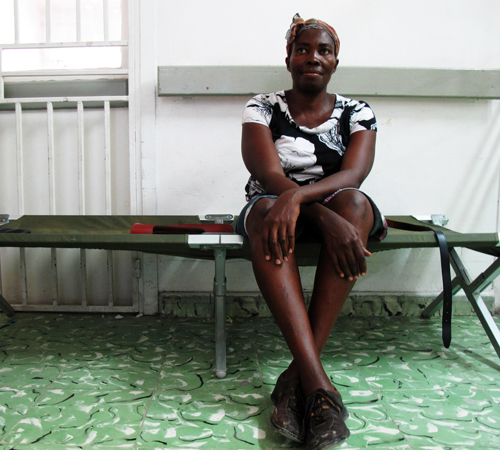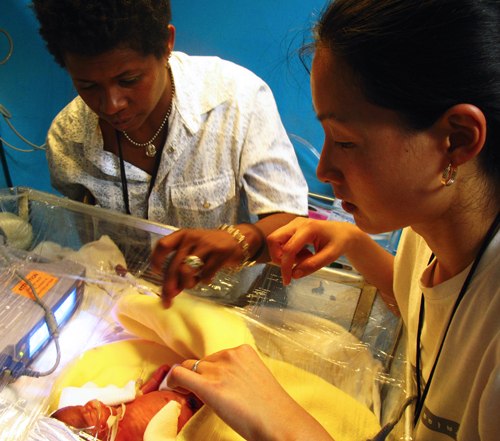CARREFOUR, Haiti -- For the fifth day now, Lubin Rosenie waited in the sweltering hallway of Hôpital Adventiste d'Haïti's emergency department, patients buzzing in and out as she held her gut. Dressed in a spotless blouse and crisp denim skirt, her misery was only betrayed by her undone belt and the way her face tightened as she described her worsening symptoms, how the hospital wouldn't remove the fibroids growing in her uterus unless she paid $400. 
If Rosenie had only come before July 12, the six-month anniversary of the earthquake, when the Haitian government lifted its mandate that all medical care be free, she might have gotten her surgery.
Uterine fibroids generally aren't fatal, but they can cause sharp pelvic pain and profuse menstrual bleeding in some cases, if left untreated for a long period of time like in Rosenie's case.
She waited more than a decade as her condition worsened before finally seeking treatment because she was "laid off" from her job as an elementary school teacher for bleeding in front of the students. She earned the equivalent of $164 per month.
During menstruation, "I bled so much that the blood started flowing down on the ground in class," she said through a translator. "Usually after [menstruation] I am so anemic that my hands turn white." Now, living under a tarp with her sister and four children, Rosenie is one of the more than 200,000 residents in Carrefour living on zero dollars a day. She is unfortunate proof that the much-touted "universal health care" system for Haitians that supposedly arose from the earthquake was only temporary.
From the hospital administration's perspective, it was either start charging, or go bankrupt and save nobody.
The free health care mandate was immediately instated for three months following the January 12 earthquake that killed an estimated 230,000 people, and then extended for another three months with the allowance to charge for only some things, like oxygen.
Dr. Dana Van Alphen, regional advisor for the World Health Organization's disaster management program, pointed out that many of the hospitals that started charging patients again were not free before the earthquake.
"To provide the quality of care that we've been providing takes X amount of money, and unless there's some huge benefactor to pay those bills, [if we don't charge] we'd go bankrupt, absolutely," said Nathan Lindsey, the hospital administrator.
Fees at Adventiste now range from $1 for a routine doctor or emergency room visit, to between $10 and $60 for an X-ray, to $400 for a cesarean. Children under the age of six are still free because of funding from the World Health Organization, and emergency cases are often forgiven.
In the country's Ouest department, which includes Port-au-Prince, at least five of the hospitals that didn't collapse during the earthquake ended up buckling under the financial pressure of providing so much free medical care during the subsequent months, according to hospital status data provided by the World Health Organization.
Centre de Diagnostique et de Traitement Intégré (CDTI), a stone's throw from the crumpled National Palace in Port-au-Prince, is the most commonly cited example because it was a brand new, state-of-the-art facility catering to a wealthy clientele before the earthquake overloaded it with thousands of people who needed expensive procedures but couldn't pay.
And an untold number of temporary clinics set up after the disaster also shut down for financial reasons, like the one the Adventist Development and Relief Agency set up in the neighboring university campus to serve a tent city of about 30,000 people.
"I understand Hospital Adventiste's financial position because I'm an administrator in an emergency department that struggles to provide free care with limited resources," said Dr. Sandra Scott, treasurer for the non-profit Unified for Global Healing (UFGH), a group of 24 doctors, social workers and artists volunteering at Adventiste.
Scott, a chief of service at the University Hospital UMDNJ in Newark, New Jersey, said since the state cut $4 million from its budget this year, her hospital is also in the process of making tough choices about scaling back on some free services.
Lindsey said his hospital -- a 70-bed facility built in 1978 that Adventist Health International took over seven years ago -- is only sustained by its foreign volunteers, whatever donations he's able to patch together, and the embassy clinic that all Haitians need to go through if they want to travel outside the country. Visits to the clinic cost around $70, and the waiting area is filled every day with children wearing taffeta dresses and matching ruffled socks or church slacks and button-ups.
With only one Haitian doctor on any given day, the foreign volunteers can literally mean the difference between life and death for many of the patients.
UFGH's 24 volunteers were given a tour of Adventiste on the first day of the new fee schedule, before starting their two-week mission there.
It was early evening, when Adventiste shifts into "after hours mode," but still the corridors seemed strangely quiet for a disaster-ravaged area (Lindsey explained that the patients come when they know there are doctors, and sure enough the hallways became fuller in the coming days).
Within two hours of the tour, three of UFGH's doctors were pulled aside to help save the life of a 28-week premature baby boy that had been written off for dead by another hospital. He didn't have a name because Haitians typically wait until they're sure the baby is going to live.
Barely breathing and having not eaten at all since his birth two days ago, the 1.6-pound baby boy would have died had UFGH's doctors not pieced together a nasal cannula and incubator, MacGuyver-style, from equipment, tubes and plastic wrap found within the pediatric ward.
That night, Dr. Seema Tiku, a pediatrician from New Jersey volunteering with the group, was asked if the amount of oxygen the baby was receiving through the make-shift nasal cannula could be reduced because there was a shortage. She said "no."

Lindsey, the hospital administrator, explained that oxygen costs the hospital around $2,000 per month, equivalent to six nurses' salaries, and has to be regularly refilled. Patients were charged around $54 for oxygen up until he stopped the practice two weeks ago.
The baby survived, and three days later, he was named after a volunteer and transferred to a University of Miami field hospital with a neonatal intensive care unit.
Despite the new pay structure, less than half of the roughly 80 patients that UFGH volunteers have treated each day since have actually had to pay, either because the patient is admitted to the emergency department where the volunteers are doing the triaging, writing the "free" code on lab work when possible, or because the patient is under the age of six.
"I order tests less frequently because I can't justify patients paying for things unnecessarily just to satisfy my curiosity or give myself validation for my diagnosis," said Tiku. "I have to rationalize why I'm ordering it and how it's going to help my patient."
However, some tests are not optional, and are expensive in a country where most people earn $2 a day. For example, it now costs $41 to get a match for a blood transfusion.
Even though the Haitian government has pledged to develop some sort of sliding scale fee schedule for health care, Lindsey said the hospital would be developing its own program instead of waiting. UFGH social workers and emergency physicians plan to consult on some sort of income-based charity care program.
"The challenge will be developing criteria that are based on the patients' report of their economic situation without substantial supporting documentation," said Scott. "In the states we would pull up their tax return, check to see if they're registered already with Medicare or Medicaid, etc."
She said the fees could be based on a point system with criteria such as the patient's housing situation, income, education level, the number of meals eaten per day, family members per household, and car ownership.